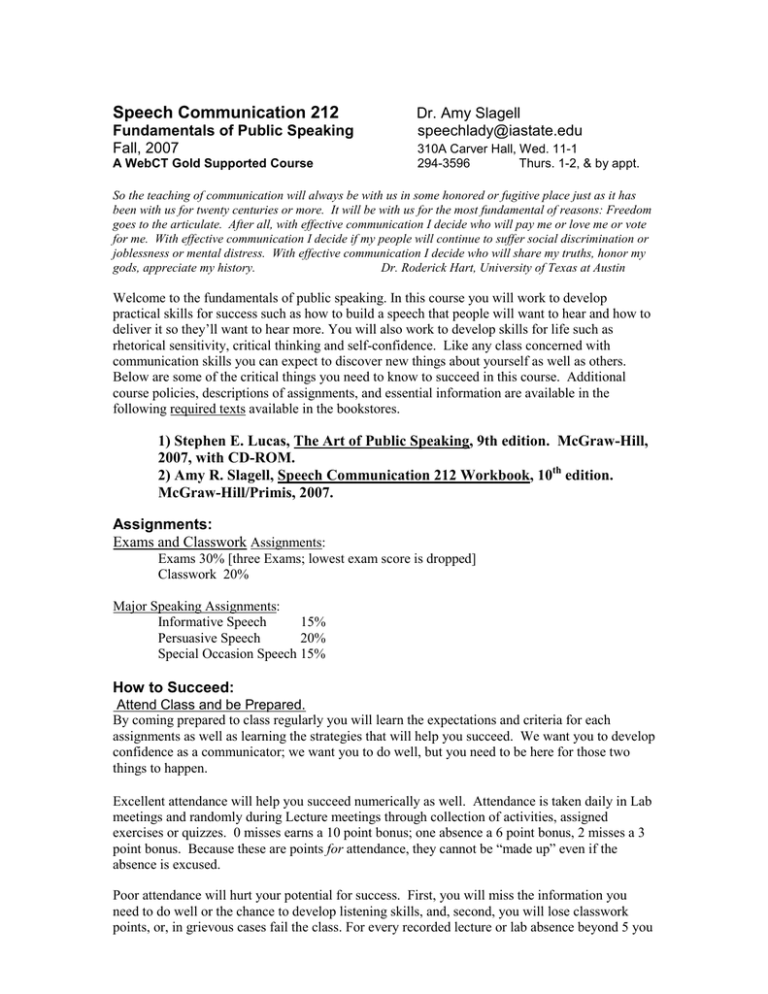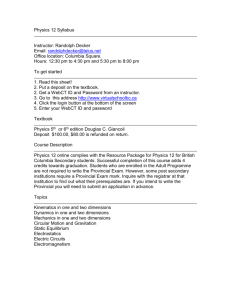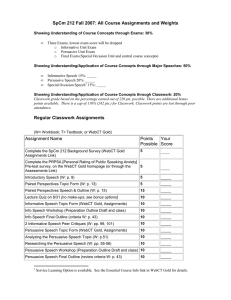Speech Communication 212 Dr. Amy Slagell
advertisement

Speech Communication 212 Fundamentals of Public Speaking Fall, 2007 A WebCT Gold Supported Course Dr. Amy Slagell speechlady@iastate.edu 310A Carver Hall, Wed. 11-1 294-3596 Thurs. 1-2, & by appt. So the teaching of communication will always be with us in some honored or fugitive place just as it has been with us for twenty centuries or more. It will be with us for the most fundamental of reasons: Freedom goes to the articulate. After all, with effective communication I decide who will pay me or love me or vote for me. With effective communication I decide if my people will continue to suffer social discrimination or joblessness or mental distress. With effective communication I decide who will share my truths, honor my gods, appreciate my history. Dr. Roderick Hart, University of Texas at Austin Welcome to the fundamentals of public speaking. In this course you will work to develop practical skills for success such as how to build a speech that people will want to hear and how to deliver it so they’ll want to hear more. You will also work to develop skills for life such as rhetorical sensitivity, critical thinking and self-confidence. Like any class concerned with communication skills you can expect to discover new things about yourself as well as others. Below are some of the critical things you need to know to succeed in this course. Additional course policies, descriptions of assignments, and essential information are available in the following required texts available in the bookstores. 1) Stephen E. Lucas, The Art of Public Speaking, 9th edition. McGraw-Hill, 2007, with CD-ROM. 2) Amy R. Slagell, Speech Communication 212 Workbook, 10th edition. McGraw-Hill/Primis, 2007. Assignments: Exams and Classwork Assignments: Exams 30% [three Exams; lowest exam score is dropped] Classwork 20% Major Speaking Assignments: Informative Speech 15% Persuasive Speech 20% Special Occasion Speech 15% How to Succeed: Attend Class and be Prepared. By coming prepared to class regularly you will learn the expectations and criteria for each assignments as well as learning the strategies that will help you succeed. We want you to develop confidence as a communicator; we want you to do well, but you need to be here for those two things to happen. Excellent attendance will help you succeed numerically as well. Attendance is taken daily in Lab meetings and randomly during Lecture meetings through collection of activities, assigned exercises or quizzes. 0 misses earns a 10 point bonus; one absence a 6 point bonus, 2 misses a 3 point bonus. Because these are points for attendance, they cannot be “made up” even if the absence is excused. Poor attendance will hurt your potential for success. First, you will miss the information you need to do well or the chance to develop listening skills, and, second, you will lose classwork points, or, in grievous cases fail the class. For every recorded lecture or lab absence beyond 5 you will lose 5 points per day in addition to whatever points you missed the opportunity to earn during that class session. Students who reach 12 absences will fail the class. Do Assignments on Time. The speaking assignments are carefully scheduled to give everyone an equal amount of speaking time during the semester. The exercises and worksheets all aim to help you develop the skills you need to complete major speaking assignments successfully. Keep up with your daily work and reading and you can do very well. Speeches must be delivered on the day assigned (sign up day for speeches is September 12). Failing to show up on your speaking day can result in an "F" on the speech. Should extraordinary circumstances arise and you decide you cannot speak on the day assigned, you must be in contact with your lab instructor before class to discuss arrangements and their consequences (penalty is typically a full letter grade deduction for each class period the speech is late regardless of the reason). Should a scheduling conflict arise, you can arrange to give a speech early without penalty. Students who fail to deliver any of the 3 major speeches (Informative, Persuasive, and Special Occasion) will not pass the course. Turn in your written assignments either through WebCT Gold or to your instructor as directed. Unexcused late written work will not earn classwork points, but you must still turn in assignments like speech topic forms in order to get feedback from your instructor. If WebCT submission is a problem, submit by email. Outlines for the informative and persuasive speeches and the manuscripts for the special occasion speech are to be typed and carefully proofread. Draft outlines are due on workshop days; Final outlines are due at the beginning of class on the day your speech is due. Use the Resources Available to Help You • Use the SpCm 212 Workbook regularly. • Check the WebCT Gold site regularly for grades, information and assignments. • Use the Textbook and CD-ROM to help you learn. Go to the library, use the Expanded Academic Index and the Instruction Commons • • Rely on your lab instructor, classmates and lecturer to help. • Maximize your classwork points; plan ahead and earn bonus points to learn more. • If you need accommodations to help you succeed in this class talk to Dr. Slagell during office hours or by appointment and be sure to visit the Disabilities Resources Office, room 1076 Student Services Building (phone: 294-6624). Focus on Improving Your Skills with Integrity This class is about developing your skills; we can all become better communicators by taking the time to make good choices. Short-cuts won’t help you develop the skills you will need in the long run. Students suspected of Academic Dishonesty or of Plagiarism will meet with their instructor and the course lecturer and the case will be turned over to the Dean of Students Office. See pp. 6, 21-22, 24, 57-58 in the Workbook, Chapters 2 and 6 of the textbook and the CD-ROM guide to bibliographic citations for information about research and citing sources both orally and in written forms so you can avoid these charges. The temptation to cheat sometimes comes from lack of self-confidence, often comes from being overwhelmed with demands on your time and occasionally comes from a lack of respect for the assignment. If you find yourself facing any of these causes, talk to your lab instructor or the course lecturer before the assignment is due so we can point you to more constructive solutions. We are seriously committed to the broad goal of helping you become an effective communicator.






